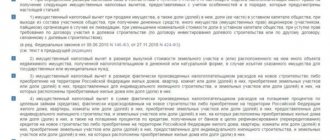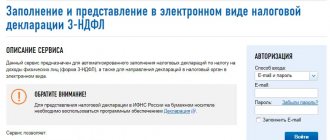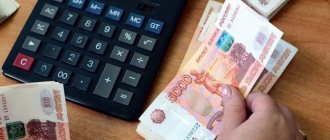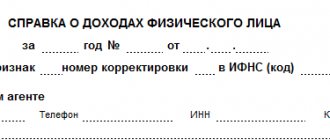Citizens who need to fill out and submit a document such as 3-NDFL to the tax service often experience difficulties with concepts such as “amount transferred from the previous year” and “deduction for previous years.” These phrases, in fact, are standard and are associated with the process of returning the property deduction (since other deductions are not transferred). In the text, we will understand what constitutes a return on previous tax documents - declarations, how to calculate the figure transferred from past years, and how the declaration is filled out in this situation - what and where the payer needs to indicate.
Deduction for previous years
And the tax is not only collected, but sometimes also returned
I got new dentures, had an expensive paid operation, received other paid medical services - using the checks provided, it is possible to return part of the money spent through the tax service.
This also applies to paid educational programs, and since 2014, to insurance products. This is a social deduction. But the largest refund will be from the amounts spent on the purchase of housing - a property deduction.
This is what we will talk about.
Instead of an afterword
Property return is the largest in terms of the amount of money that you can get back into your wallet. The higher a citizen’s salary and the larger the amount of income tax he transfers to the treasury, the more money he can return at a time using the deduction. But most often the transferred personal income tax is several times less than the maximum refund amount, so the payer receives the money in parts. We have explained in detail how this happens. Good luck getting your deductions!
Annually receiving part of the property deduction is a pleasant bonus to the family budget
Who will get some of the money back for purchases?
- You must be a citizen of Russia, live, work and pay taxes on its territory.
- You have received a residence permit in Russia from the Federal Migration Service and most of the time you are on its territory, working and paying taxes to its treasury.
In the language of the tax authorities, you must be a resident of the Russian state. If these conditions are met, you have the right to return the money spent on the purchase of housing (we will only talk about this) through a formalized tax deduction (Article 220 of the Tax Code of the Russian Federation).
Amounts of tax deductions and deadlines for receiving them
It is stupid to count on any return of money spent from the state for someone who does not pay the state themselves.
You can only return for the year the amount that you paid to the state as tax. Not from all money spent or earned, but only from a certain amount (before 2008 - 13% from 1,000,000 rubles, from 2008 to the present 13% from 2,000,000 rubles). The maximum that can be returned is 260 thousand rubles.
The big boss bought an apartment for 7 million in 2010. From a monthly salary of 200 thousand rubles. for the year he transferred 312 thousand rubles in tax. He can apply for a deduction in 2011.
In this situation, he will receive a deduction in the year of filing the declaration in the entire amount at once, but not more than 260 thousand.
An ordinary employee with a small salary bought a house for 2 million. The 13% transferred to the state treasury per year will amount to 100 thousand rubles. A refund of 260 thousand rubles is possible according to three options.
Deduction for previous year declarations
In the preface it was mentioned that the concept relates to property return - deduction of income tax during the construction or purchase of housing. This means that any personal income tax payer has the right to a refund of thirteen percent of the money spent on improving housing conditions. The tax is returned when a person acquires a house or cottage, as well as a plot of land for a residential building, an apartment or a room, as well as a share in all of the listed objects.
Let us remind you that all officially employed citizens working in our country are required by law to contribute part of their labor and other income to the state treasury. As a rule, these funds are withheld and transferred by the employer himself, who is in the status of a tax agent for hired employees. However, on unearned income - winnings, dividends, money from subletting or rent, citizens pay personal income tax personally.
How much can you expect?
For residents of Russia, the income rate is 13%, for non-residents – 30%. Note that the first are considered to be persons who reside in the country for 183 consecutive days within twelve months. It is permissible to leave for six months without losing your status for treatment, training or work in offshore oil fields. Employees of law enforcement and government agencies and representatives of local government bodies may leave the country for an annual period of time on duty.
Who is a tax resident of the Russian Federation? Our article will help you figure this out. In it we will look at what the tax status depends on, documents for confirmation, as well as the regulatory framework for residents and non-residents.
Let's return to the issue under study. All personal income tax payers can claim a refund in a number of life situations. Not all spent, but only a part less than or equal to the income contributions paid for the year. According to the law, there are six tax deductions in Russia, four of which are considered the most popular.
Table 1. Type of tax deductions
| Deduction | Decoding |
| Standard | Rely on parents with children, including adopted or guardian children. The benefit is designed for minor offspring, as well as full-time students until their 24th birthday. This type of benefit applies to veterans, heroes of the Union and the country, blockade survivors, Chernobyl survivors, released concentration camp prisoners, military personnel, disabled people and people suffering from a number of diseases. There is no deduction for previous years - the standard benefit is “delivered” to citizens on a monthly basis. |
| Property | We have already mentioned that the deduction is due to all personal income tax payers, without exception, who are considered residents of Russia. There are two restrictions on the deduction. Firstly, the limit on the value of real estate is two million rubles (maximum return - 260 thousand rubles) when paying for housing with your own money and three million rubles (maximum return - 390 thousand rubles) when paying for a mortgage. Secondly, you can get a refund once in a lifetime. That is, a person can purchase housing and receive thirteen percent of its cost until the limited figure is completed. |
| Professional | From the name it is clear that the professional type of deduction is due to representatives of specific specialties or people with nuances in their work activities. This includes the authors and heirs of significant cultural works, and secondly, private practitioners. The latter include tutors, traditional healers, lawyers, detectives and the like. Professional deductions are not carried forward, as they are due to payers every month. |
| Social | Social deductions are available to payers who spent money on maintaining health or gaining new knowledge for themselves or close relatives. The benefit can be returned for treatment or the purchase of pharmaceuticals, education, as well as payment for insurance, pension contributions or charity. Social returns are limited to one hundred twenty thousand rubles and are not carried over to subsequent years. But, for example, a refund for treatment can be made every year. |
Child tax deduction: how to prepare documents
In the material presented, we discuss how to go through this bureaucratic procedure and use the right to receive a cash deduction for children.
Calculating deductions for previous years is not at all difficult
From here we move on to the remaining questions.
New in legislation
Until 2014 tax deduction:
- was registered for one property;
- you could use it once in your life;
- the amount of the deduction was distributed among the co-owners of common shared property depending on the size of the share. We bought an apartment for 3 million rubles in equal shares with my wife, and received a deduction from 2 million, also for two. Both have exhausted their right to deduction.
From January 1, 2014, a tax deduction is provided to a citizen once in the amount of 2,000,000 rubles. for the acquisition of a real estate object/objects (Federal Law No. 212 dated July 23, 2013).
The Sidorovs bought an apartment for 3 million rubles. into shared ownership in 2021 and got the opportunity to return every 13% of 1.5 million rubles (with the required 2 million per person).
They are getting divorced in 2021, and they both still have 0.5 million rubles left to buy a second home, from which they can receive a tax deduction.
Deduction for previous years in the 3-NDFL declaration: what to write
The Tax Code in Chapter 23, devoted to income tax, provides citizens, under certain conditions, with the opportunity to return previously paid tax or not pay it in the future. This opportunity is called the right to deduction. Deductions are given in Articles 218 - 221 of the Tax Code of the Russian Federation.
What is a deduction? This is an amount that is deducted from the tax base when calculating personal income tax. Reducing your basis reduces your tax, and the difference between the tax before and after the deduction is applied is what you get.
Important!
The Tax Code of the Russian Federation provides maximum amounts of compensation, but if your expenses are less than these amounts, then you can only return within the limits of actual expenses.
Example 1
Olga Gavrilova is a full-time student at the university and paid 40,000 rubles for the first year of study. She pays personal income tax because she works as an assistant accountant on the evening shift.
According to Article 219 of the Tax Code of the Russian Federation, the maximum deduction for expenses on one’s studies is 120,000 rubles, but Gavrilova’s actual expenses are less - only 40,000, which means that her tax base will be reduced by 40,000.
The second limitation is the tax base itself. If it is less than the deduction, then the refund will be calculated based on the base.
Example 2
Olga Gavrilova pays 150,000 rubles for her studies. Her income for the calendar year amounted to 100,000 rubles, since her husband actually pays for her education.
The first limit is actual expenses and the maximum amount. Gavrilova’s actual expenses are 150,000, and the maximum compensation under Article 219 is 120,000 rubles. Therefore, the maximum compensation value is taken for calculation.
The second limit is the base. Gavrilova’s base is less than the maximum deductible amount, therefore, the base is taken for calculation. Those. The smallest value is always taken. As a result, 100,000 rubles will be deducted from the base, and the base will become zero. This difference is the amount for calculating compensation.
In this case, the method of receiving compensation depends on the will of the payer:
In the first case, there is a refund of the tax amounts paid, and in the second - receiving wages without charging 13%. The return can cover the past 3 years - if the right to it also arose 3 years ago or earlier. If the right arose earlier, then you can still only return it for the last 3 years; all previous years “burn out.”
So, what is a deduction for previous years in 3-NDFL - this is a refund of the tax paid for these years, subject to the conditions of Chapter 23 of the Tax Code of the Russian Federation. To return for 3 years at once, you must submit 3 separate declarations with separate income certificates (for each year), checks, etc. Documents that have not changed can be attached only to one report, for example, contracts, licenses, etc.
Important!
For each year, you must fill out the form that was in effect at that time.
and 3-NDFL for tax deductions and declaration of income for different periods can be found at the link .
How to calculate deductions for previous years in the 3-NDFL declaration - based on 2-NDFL certificates. You need to contact the accountant at your place of work and request certificates for each year. These certificates contain the most important information - how much income tax was paid for you by your employer when calculating your salary. The certificate will contain separate amounts by month and a total for the entire year.
Next, you need to calculate the expenses to be reimbursed, for example, for study, for 3 years. Please note what date is indicated on the receipt; if you paid for the entire course in September 2015, then these expenses are not included in the compensation, but if the transaction was made in 2016, starting from January 1, then you can reimburse the expenses. Compare expenses with the limits under the Tax Code of the Russian Federation and the base.
Example 3
Olga Gavrilova pays 90,000 rubles a year for her higher education. She works as a real estate agent and earns 600,000 rubles a year, of which she pays personal income tax - 78,000 rubles. In her fifth year, she decided to receive a social benefit for her studies.
Despite the fact that the expenses took place over the past 4 years, Gavrilova cannot reimburse them for the first year. For the remaining courses she will return 78,000 rubles. Total: 78,000 + 78,000 + 78,000 = 234,000 rubles. She will be able to compensate for the fifth year only next year.
If you have questions or need help, please call Free Federal Legal Advice.
Tax deduction for interest accrued on a loan
Sidorov buys a new apartment for 4 million rubles, of which he takes out a mortgage loan for 3 million for 5 years at 8.5% per year.
With 500 thousand of his own money, he will receive a return of 13% (the lost deduction from the purchase of the first apartment).
Sidorov also issued a tax deduction for the interest accrued on the loan: 13% from 700 thousand rubles. (amount of interest for 5 years). True, the amount of credit interest that can be deducted is limited to 3 million rubles. (Subclause 4, Clause 1 and Clause 4, Article 220 of the Tax Code of the Russian Federation).
How to fill out 3-NDFL?
Let's simulate a situation similar to the example above in order to understand which lines and what data need to be filled in the declaration. So, Sergei Semenovich Vysotkov purchased housing last year and for the first time wants to get a refund. The actual expenses incurred on purchasing housing are either two million rubles or a larger amount. The tax base is Vysotkov’s income for the year, let’s take the figure of three hundred thousand rubles. The balance of the property tax deduction carried over to the next year is 2,000,000 rubles (limit on the cost of housing) minus 300,000 rubles (annual salary) = 1,700,000 rubles. This is data for the first year.
To receive any refund, you must fill out and submit to the Federal Tax Service a declaration in form 3-NDFL. Read our article on how to fill out this form.
We again repeat from the previous declaration the amount of expenses actually incurred - this is two million rubles. The deduction amount already accepted for accounting last year is 300 thousand rubles, we are also rewriting the data from the previous document. The balance, as we remember, is 1,700,000 rubles, it goes into the new year from the past year. Now the financial base figure is entered again. Let's assume that Vysotkov was promoted within a year and now he earned 400 thousand rubles. Accordingly, the balance of 1,400,000 rubles (1,700,000 minus 400,000) is again transferred to the next year.
When Vysotkov fills out the declaration for the third year, he will again indicate all this data, and if his salary does not increase, after three years the remaining deduction will be a million rubles. According to this scheme, the citizen will fill out all subsequent declarations for future years until the tax deduction due to him is returned in full.
Video - How to fill out the 3rd personal income tax declaration in 5 minutes
Who is not eligible to receive a tax deduction?
You cannot count on deductions:
- when concluding a purchase and sale agreement for residential premises between close relatives;
- when purchasing square meters at the expense of the employer;
- when using so-called maternity capital to purchase funds.
Sidorova decided to buy her parents’ private house. Father and daughter are interdependent people not only by blood, but also by law. In view of this, Sidorova would not have been able to apply for the remaining uncollected deduction from 0.5 million rubles upon purchase in her own name.
The law includes a spouse, parents, children, brothers and sisters as close relatives.
The house was bought in the name of Sidorova’s minor son, since the relationship between grandfather and grandson is not considered a crime for the tax authorities. Sidorova received the deduction, but her son did not lose the right to use the property deduction in the future (clause 6 of Article 220 of the Tax Code of the Russian Federation).
A pensioner will not receive a refund if he has not worked for more than three years. He didn’t pay taxes until he worked; the state has nothing to return to him. If you work in retirement, then please apply for a deduction according to the general scheme, if you have never received it before.
How to find out if a taxpayer has previously received a deduction
A property deduction is given once in a lifetime to every citizen if he had expenses for the purchase, construction or repair of housing. Whether a citizen received a tax deduction when purchasing an apartment is indicated in the AIS-Tax database, so there is no point in applying for a refund a second time - you will receive a refusal.
The Federal Tax Service stores information not only about the use of the right to reimbursement, but also about the balances if you have not returned the maximum, so in no way will it be possible to reimburse expenses twice or more. But if you register ownership of another person - for example, a spouse, then he can receive a refund according to the annual personal income tax paid.
Important! You can receive a deduction for housing registered in the name of your minor child, but it will be taken into account as the use of your one-time right, while a child over 18 years of age can receive independent compensation.
What's the result?
- If you bought an apartment, use your right to a tax deduction. The maximum amount with which you will be given back 13% is 2,000,000 rubles. Do not wait more than three years to submit documents to the tax office.
- Buying housing from relatives or using other people's/state money is unprofitable. You will not receive a refund for such transactions.
- Try to take out a mortgage loan at the lowest interest rate. Tax refund on loan interest will further help you reduce your financial burden.
- Tax deduction only for those who officially work.










